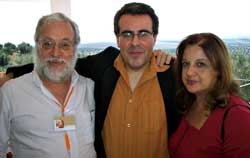Serpa conference:
Imperialist decay demands revolutionary response
By
John Catalinotto
Serpa, Portugal
Published Oct 26, 2007 11:03 PM
Some 36 Marxist activists, writers and thinkers from 15 countries gathered Oct.
5, 6 and 7 in the town of Serpa in the Alentejo region of Portugal to
contribute to a special kind of conference. They dedicated their contributions
to examining the challenges facing the working-class movement in the
post-Soviet period, as the world system of capitalism and imperialism
experiences a deep, broad and perhaps terminal crisis.
|
Reinaldo Carcanholo (Brazil),
Remy Herrera (France) and
Leila Ghanem (Lebanon) at Serpa,
Portugal, conference.
WW photo: John Catalinotto
|
The team that maintains the Portuguese-language website odiario.info organized
the conference with the help of the municipality of Serpa and the magazine
Vertice.
Unlike some gatherings of academic Marxists—even those few who apply
Marx’s teachings instead of the many who try to revise his most important
work—this one was made up mostly of political activists, some of them
leaders of communist parties. They supported the struggle of the oppressed
nations against imperialism; most looked to the working class as the
revolutionary subject of history and to the Russian revolutionary leader Lenin
for an approach toward organizing a struggle for state power.
The Alentejo was a center of anti-fascist struggle during the decades before
Portugal’s 1974 revolution. In 1962 hundreds of thousands of agricultural
workers challenged the fascist Salazar regime with strikes for the eight-hour
day. Though the region’s economy has completely changed in mere decades,
the traditions of class struggle and anti-imperialist struggle remain and this
region is still a stronghold of the Portuguese Communist Party (PCP).
Many of the hundreds of people attending the sessions of the conference were
from the Alentejo or had done some of their political work there. It seemed
like everyone over 50 years of age had either worked clandestinely, been in the
fascist prisons, broken out of them, or all three. Such an audience encouraged
rigor and discipline on the part of the speakers.
What is to be done?
The conference’s title was “Civilization or Barbarism.” Many
of the speakers—some of whom were economists—dissected the serious
crises faced by the capitalist world economy and their impact on the working
class. Others attacked U.S. imperialism’s aggressive wars and the
European ruling classes that joined these adventures in Iraq and Afghanistan,
or who supported the Israeli regime in Palestine.
The conference’s guiding theme, however, was how to promote a socialist
revolution to overcome the misery heaped on the mass of humanity by a
globalized imperialist system in crisis. A concurrent theme was how also to
overcome the setback to socialist ideology that followed the material loss to
the world workers’ movement of the Soviet Union and the East European
socialist countries of 1989-1991.
Speakers came from India, Egypt and Lebanon. Most came from Portugal itself,
from France and the other Latin-language countries in Europe and from across
Latin America, including Mexico, Cuba, Venezuela, Bolivia, Argentina and
Brazil, and one from the United States. The Latin American speakers reflected
both the opportunities arising from the election of progressive
leaders—especially in Venezuela, Bolivia and Ecuador—and also the
challenges faced by the revolutionary movements in those countries.
Marcos Domich, international secretary of the Communist Party of Bolivia,
warned of the threat of counter-revolution in his country: “The ruling
classes and the owners of property never abandon their power and privileges
without putting up a battle.”
Isabel Monal, editor of the Cuban journal “Marx Ahora” (Marx Now),
underlined the vital importance of the emergence of Indigenous leadership of
many of the struggles in Latin America, pointing to Evo Morales in Bolivia.
Cuba had a special place in the hearts and minds of the participants, as was
shown in the conference’s closing statement: “Demand an end to the
blockade imposed on Cuba by the USA and salute the Cuban people for their
example of heroic and victorious resistance to imperialism.”
Lebanese environmental editor Leila Ghanem discussed the role of the
Islam-based movements Hezbollah and Hamas in combating imperialism and Zionism
in Lebanon and Palestine. This explanation was needed to promote solidarity for
these struggles among progressive movements in Europe and North America.
Angeles Maestro from Spain exposed the horror imperialist globalization
inflicts on countries like Nigeria, forcing a migration that is as deadly as
the “middle passage” of the slave trade. One of every three
immigrants drowns on the perilous trip to an uncertain future in Europe.
Other speakers exposed the threat to the workers in the imperialist centers.
These workers now face a relentless attack on their wages, benefits and way of
life. Social democratic parties, which at one time promoted benefits, are now
imposing these pro-capitalist neo-liberal policies.
The Portuguese communist journalist Miguel Urbano Rodrigues, a key organizer of
the conference, ended his contribution with the following call to struggle:
“To pass therefore from the defensive to the offensive is a requirement
of our time, imposed upon the forces and parties for which the alternative to
[imperialist] barbarism is socialism.”
Workers World managing editor John Catalinotto presented a paper entitled
“Imperialist Globalization Creates Its Own Gravediggers” and spoke
on the class struggle within the U.S. at a satellite meeting in nearby Beja,
Portugal, and at a meeting in Madrid, Spain. See odiario.info for the
conference statement and for the contributions in the original language and in
Portuguese. E-mail: [email protected]
Articles copyright 1995-2012 Workers World.
Verbatim copying and distribution of this entire article is permitted in any medium without royalty provided this notice is preserved.
Workers World, 55 W. 17 St., NY, NY 10011
Email:
[email protected]
Subscribe
[email protected]
Support independent news
DONATE


